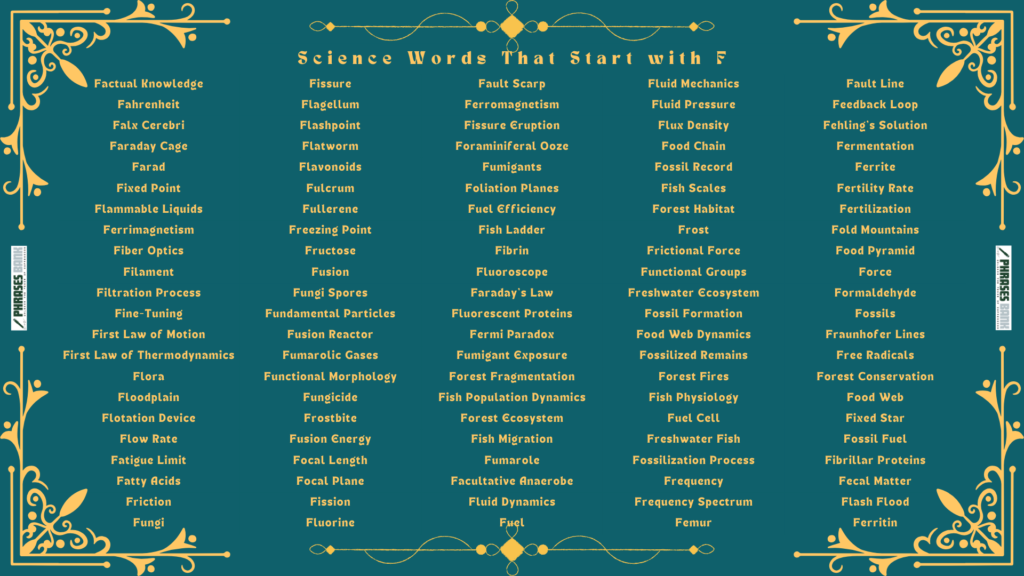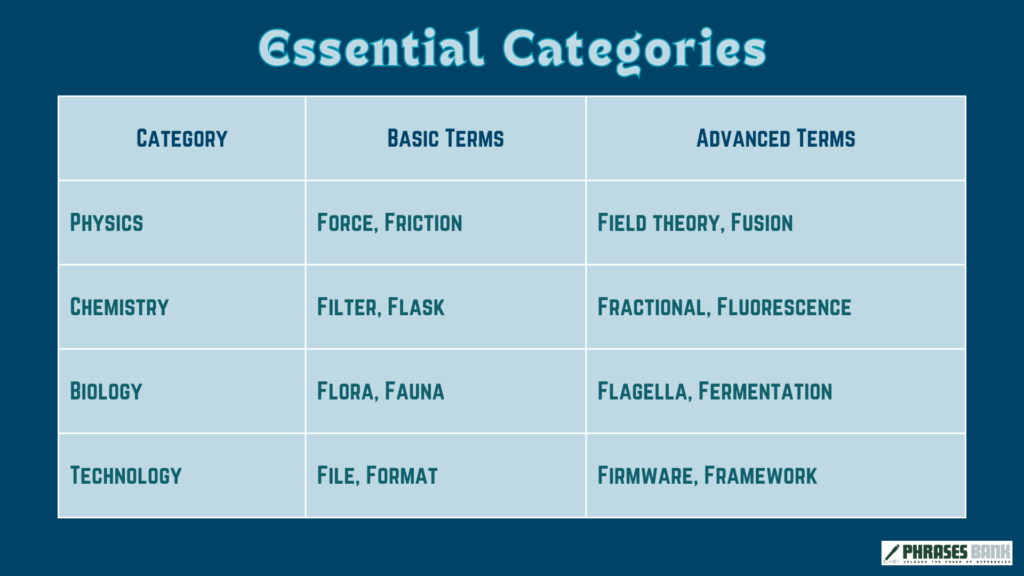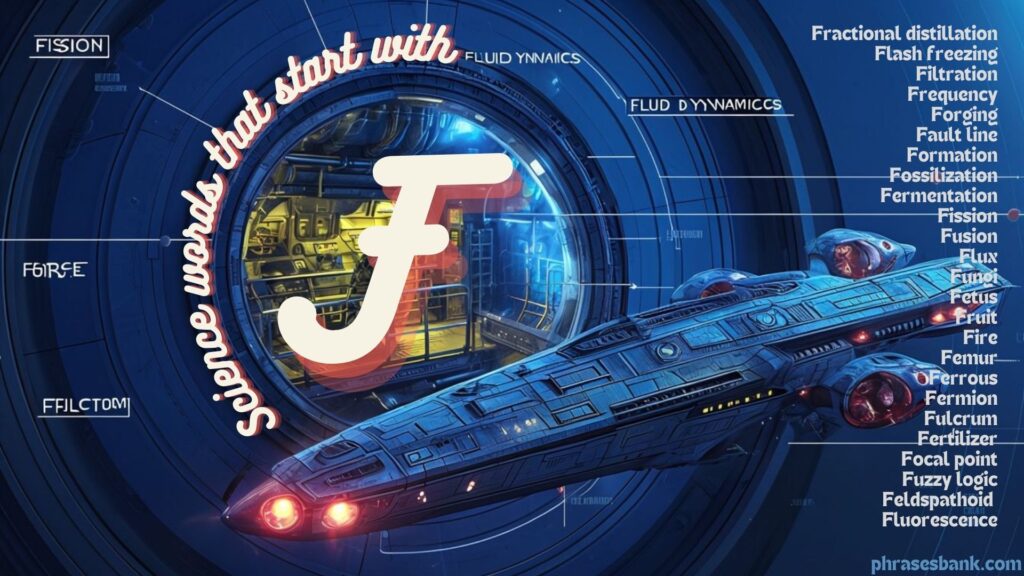Introduction to Science words that start with F
The world of scientific terminology is vast and intricate, with words that capture everything from the tiniest particle interactions to the grandest cosmic phenomena. This comprehensive guide explores 150+ essential science words that start with F that form the backbone of scientific vocabulary across various disciplines.
Core Scientific Disciplines: Breaking Down the Fundamentals
Physics Terminology
Physics, the study of matter and energy, employs numerous F-words that describe fundamental concepts and natural phenomena. Here are some essential terms:
- Force: The push or pull that acts upon an object
- Friction: The resistance force between surfaces in contact
- Fusion: The process of combining atomic nuclei
- Field: A region where a force acts upon an object
- Frequency: The number of occurrences per unit time
- Farad: Unit of electrical capacitance
- Fermi level: Highest energy level occupied by electrons at absolute zero
- Field strength: Intensity of an electric or magnetic field
- Fluid dynamics: Study of forces and flow in liquids and gases
- Flux density: Rate of flow through a unit area
- Force carrier: Particle that mediates fundamental forces
- Focal length: Distance from lens to focal point
- Free fall: Motion under gravity alone
- Fresnel lens: Composite lens used in lighthouses and solar applications
- Frictional force: Resistance force between surfaces in contact
- Field vector: Quantity having both magnitude and direction in a field
- Ferromagnetism: Strongest type of magnetic behavior
- Frame of reference: Coordinate system for measuring position and motion
- Frequency modulation: Variation in wave frequency to transmit information
- Fusibility: Ability of a substance to be melted
- Fusion reactor: Device using nuclear fusion to produce energy
- Fundamental force: Basic forces of nature (gravity, electromagnetic, strong, weak)
- Free body diagram: Visual representation of forces acting on an object
- Fraunhofer lines: Dark lines in solar spectrum
- Flux quantum: Minimum amount of magnetic flux
“The four fundamental forces of nature – gravitational, electromagnetic, strong nuclear, and weak nuclear – govern everything in our universe.” – Richard Feynman
Chemistry Corner
Laboratory terminology in chemistry includes processes and phenomena crucial to understanding material interactions:
| Term | Definition | Application |
|---|---|---|
| Fermentation | Metabolic process converting sugar to acids, gases, or alcohol | Food production, biofuel |
| Filtration | Separation of solids from fluids | Laboratory procedures |
| Fluorescence | Emission of light by a substance | Scientific analysis |
| Fission | Nuclear splitting | Energy production |
| Factice | Vulcanized vegetable oil used as rubber substitute | Rubber industry extenders, printing roller manufacturing |
| Fajans’ rules | Rules predicting covalent/ionic bond character | Drug design, inorganic synthesis |
| Ferrocene | Organometallic compound with sandwich structure | Fuel additives, anti-knock agents, cancer therapeutics |
| Fizzing | Release of gas bubbles during chemical reaction | Beverage carbonation, cleaning products |
| Flocculation | Process where particles clump together | Water treatment, mining operations, paper manufacturing |
| Formal charge | Electric charge assigned to an atom in a molecule | Drug design, molecular modeling |
| Formaldehyde | Simple organic compound (CH2O) | Wood preservation, textile treatment, resin manufacturing |
| Fractionation | Separation of mixture into components | Petroleum refining, blood component separation |
| Free radical | Molecule with unpaired electron | Polymer synthesis, food preservation, paint drying |
| Freezing point | Temperature at which liquid becomes solid | Antifreeze development, food preservation |
| Functional group | Specific atom arrangement giving characteristic properties | Polymer synthesis, material modification |
| Fugacity | Effective pressure of a gas in mixture | Gas separation design, thermodynamic calculations |
| Flash point | Lowest temperature at which vapors ignite | Fuel safety, transport regulations, fire prevention |
| Fuming | Emission of vapor from concentrated solution | Chemical processing, laboratory safety , industrial ventilation |
| Fluorination | Addition of fluorine atoms | Material modification, water treatment, polymer production |
| Flux | Substance that aids metal fusion | Metal welding, electronics manufacturing, glass production |
| Formulation | Mixture preparation according to formula | Pharmaceutical production, cosmetics manufacturing, paint production |
| Freezing mixture | Mixture that absorbs heat while melting | Laboratory cooling, food processing, chemical reactions |
| Furnace | Device for high-temperature heating | Metal processing, glass manufacturing , heat treatment |
| Fusion heat | Energy required to melt substance | Material processing, phase transition studies, thermal analysis |
Biological Sciences
In biological processes and systems, F-words describe vital structures and functions:
- Flagella: Whip-like structures for cell movement
- Fungi: Kingdom of eukaryotic organisms
- Fascia: Connective tissue surrounding muscles
- Fetus: Developing offspring in mammals
- Facilitated diffusion: Assisted movement of molecules across membranes
- Facultative anaerobe: Organism that can live with or without oxygen
- Fallopian tube: Female reproductive duct
- Fascicle: Bundle of muscle or nerve fibers
- Fatty acid: Basic component of lipids
- Feedback loop: Control system in biological processes
- Ferritin: Protein that stores iron
- Fertilization: Union of gametes
- Fimbriae: Hair-like bacterial surface structures
- Fibroblast: Connective tissue cell
- Filament: Thread-like structure
- Fission: Asexual reproduction by splitting
- Flagellum: Whip-like locomotory structure
- Follicle: Small secretory cavity or sac
- Food vacuole: Digestive organelle in protozoans
- Foramen: Natural opening in bone
- Formed elements: Cellular components of blood
- Fragment: Piece of chromosome or DNA
- Frameshift: Genetic mutation affecting reading frame
- Fructose: Simple sugar in fruits
Educational Level Classification
Elementary Level
Grade 4th & Grade 5th science words that start with F
Simple scientific concepts appropriate for young learners:
- Food chain: How animals get food in nature
- Freezing: State change from liquid to solid
- Flower: Basic plant anatomy
- Force: A push or pull on an object
- Friction: Resistance between surfaces
- Float: To stay on top of liquid
- Flow: Movement of liquid or gas
- Flower: Plant reproductive structure
- Fish: Aquatic vertebrate
- Fog: Cloud at ground level
- Fruit: Plant part containing seeds
- Fall: Autumn season
- Fire: Heat and light from burning
Middle School
Grade 6th, Grade 7th & grade 8th science words that start with F
More complex technical language and processes:
| Word | Definition | Subject Area |
|---|---|---|
| Fossil | Preserved remains | Earth Science |
| Filter | Separation device | Physics/Chemistry |
| Fungus | Kingdom of organisms | Biology |
| Fertilizer | Plant nutrient | Agriculture |
| Fulcrum | Pivot point | Physics |
| Fuse | Safety device | Electronics |
| Flash point | Ignition temperature | Chemistry |
| Food web | Ecosystem connections | Biology |
| Fault | Rock fracture | Geology |
| Frequency | Rate of occurrence | Physics/Math |
| Framework | Basic structure | General Science |
| Fermentation | Biological process | Biology |
High School and Beyond
Grade 9th, grade 10th, grade 11th & Grade 12th science words that with F
Advanced scientific nomenclature and theoretical concepts:
- Fluid dynamics: Study of fluid flow
- Factorial: Mathematical operation
- Fibonacci sequence: Mathematical pattern
- Field theory: Physical space properties
- Fission: Nuclear splitting process
- Fusion: Nuclear combining process
- Fibonacci: Mathematical sequence
- Fluid dynamics: Liquid/gas motion study
- Fluorescence: Light emission process
- Focal point: Light convergence point
- Function: Mathematical relationship
- Factorial: Mathematical operation
- Fractal: Self-similar pattern
- Ferromagnetism: Magnetic property
- Flux: Flow rate through surface
- Fecundity: Reproductive potential
College/Professional Level science words that with F
Specialized scientific lexicon:
| Advanced Term | Application (Field) | Definitions |
|---|---|---|
| Fluorophore | Molecular marking (Chemistry) | A fluorescent chemical compound that absorbs light at one wavelength and emits light at a longer wavelength. |
| Femtosecond | Time measurement (Physics) | A unit of time equal to one quadrillionth of a second. |
| Faraday constant | Electrochemistry (Chemistry) | The magnitude of electric charge carried by one mole of electrons. |
| Fibration | Topology (Mathematics) | A mathematical structure used to describe the geometry of certain spaces. |
| Fermion | Particle physics (Physics) | A type of elementary particle that obeys Fermi-Dirac statistics. |
| Flagellum | Cell movement (Biology) | A whip-like structure that allows cells to move. |
| Fluorimetry | Analysis method (Chemistry) | A technique used to measure the intensity of fluorescence emitted by a sample. |
| Fourier transform | Signal processing (Mathematics) | A mathematical technique used to decompose a function into its constituent frequencies. |
| Feynman diagram | Particle interactions (Physics) | A diagrammatic representation of particle interactions. |
| Fragmentation | Population genetics (Biology) | The process of breaking down a larger molecule into smaller fragments. |
| Functional group | Molecular structure (Chemistry) | A specific group of atoms within a molecule responsible for its characteristic chemical reactions. |
| Fibroblast | Cell type (Biology) | A type of cell that produces collagen and other connective tissue proteins. |
Post-Graduate Level science words that with F
Highly specialized technical language:
- Femtochemistry – Ultrafast chemical reactions
- Flavonoid biosynthesis – Plant metabolism
- Fluorescence anisotropy – Molecular analysis
- Factor analysis – Statistical method
- Formalin fixation – Tissue preservation
- Fuzzy logic – Mathematical theory
- Feld-Knapp reaction – Organic synthesis
- Flow cytometry – Cell analysis
- Fractional crystallization – Purification method
- Förster resonance – Energy transfer
- Feldspathoid – Mineral classification
- Functorial morphism – Category theory
“Understanding scientific terminology at each educational level builds a strong foundation for advanced learning and research capabilities.”
These classifications help educators and learners identify appropriate scientific vocabulary for different learning stages. Each level builds upon previous knowledge, creating a comprehensive understanding of scientific concepts and processes.

Applied Sciences and Modern Research Words that start with F
Engineering Applications
Technical language in engineering encompasses both theoretical and practical aspects:
- Fabrication: Manufacturing processes and techniques
- Finite element analysis: Structural analysis method
- Fluid mechanics: Study of fluid behavior
- Fatigue testing: Material stress evaluation
Medical Sciences and Terminology
The medical field utilizes precise scientific lexicon for describing:
| Category | Terms | Applications |
|---|---|---|
| Anatomy | Fascia: A thin layer of connective tissue in the body. Femur: The thigh bone, connects hip to the knee. Fibula: The smaller of two bones in lower leg. | Physical examination |
| Diseases | Fibromyalgia: Chronic pain disorder with widespread muscle aches and fatigue. Flu: Contagious respiratory illness caused by viruses. | Diagnosis |
| Procedures | Fistulation: Creating an artificial passage between body parts. Fixation: Securing something in a stable position. | Surgical methods |
| Testing | Flow cytometry: Analyzing cells by passing them through a detector. Fluoroscopy: Real-time X-ray imaging. | Medical imaging |
Earth and Space Sciences
Understanding our planet and cosmos requires specialized natural phenomena terminology:
Geological Terms
- Fault line: Crack in Earth’s crust
- Formation: Rock unit with distinctive features
- Facies: Rock or sediment characteristics
- Fossilization: Organic preservation process
Astronomical Concepts
- Field stars: Background stars in observations
- Filament: Solar surface feature
- Flux: Rate of energy flow
- First light: Initial telescope operation
Laboratory and Research Methodologies Words that start with F
Equipment and Instrumentation
Essential laboratory equipment includes:
- Flask: Various containment vessels
- Furnace: Heating apparatus
- Flow meter: Fluid measurement device
- Fluorometer: Light measurement tool
Research Techniques
Modern scientific exploration employs sophisticated methods:
| Technique | Purpose | Field |
|---|---|---|
| Fractionation | Separation of mixtures | Chemistry |
| Flow analysis | Fluid behavior study | Physics |
| Fluorescence microscopy | Cellular imaging | Biology |
| Field sampling | Environmental data collection | Earth Science |
Also read: Science Words That Start With L
Modern Technology Applications’ Words that start with F
Computer Science Integration
Technical language in computing includes:
- Firewall: Network security barrier
- Firmware: Device control software
- Framework: Development structure
- File system: Data organization method
Environmental Science
Natural systems terminology encompasses:
- Flora: Plant life
- Fauna: Animal life
- Food web: Ecosystem relationships
- Freshwater ecology: Aquatic systems
Practical Applications and Industry Usage Words that start with F
Industrial Processes
Common scientific processes in industry:
| Process | Industry | Application | Definition |
|---|---|---|---|
| Fractional distillation | Petroleum | Fuel production | Separating liquids by differences in boiling points. |
| Flash freezing | Food | Preservation | Rapidly freezing something to preserve it. |
| Filtration | Water treatment | Purification | Separating substances by passing through a barrier. |
| Forging | Manufacturing | Metal forming | Shaping metal by hammering or pressing. |
Research Applications
Academic research terminology includes:
- Factor analysis: Statistical method
- Field testing: On-site research
- Feasibility study: Project evaluation
- Formal verification: System validation
Educational Resources and Learning Tools
Teaching Materials
Supporting scientific literacy through:
- Interactive diagrams
- Video demonstrations
- Virtual laboratories
- Field exercises
Assessment Guidelines
Measuring understanding of scientific concepts:
| Level | Assessment Type | Focus Areas |
| Basic | Multiple choice | Term recognition |
| Intermediate | Short answer | Process explanation |
| Advanced | Project-based | Application |
| Expert | Research paper | Theory development |
Also read: A to Z science and technology fields
Digital Resources and Modern Learning
Online Platforms
Scientific communication tools:
- Collaborative platforms
- Virtual laboratories
- Interactive simulations
- Database access
Reference Materials
Supporting academic vocabulary:
- Digital textbooks
- Scientific journals
- Online encyclopedias
- Research databases
Conclusion and Future Perspectives
The evolution of scientific terminology continues as new discoveries emerge. Understanding these scientific words that start with F provides a foundation for:
- Advanced research
- Technical communication
- Scientific innovation
- Educational development
“The language of science bridges the gap between observation and understanding, allowing us to describe and manipulate the natural world with unprecedented precision.”
Quick Reference Guide for Science words that start with F

Further Reading
For continued exploration of scientific exploration:
- Academic journals
- Research publications
- Technical manuals
- Educational resources
This comprehensive guide serves as a foundation for understanding the vast landscape of scientific words that start with F, from fundamental concepts to advanced applications. Whether you’re a student, educator, or researcher, these terms form an essential part of scientific literacy and communication in modern research and education.
Explore commonly confused words: Appealing or Appalling!

Nat Webb is a dedicated writer at PhrasesBank, specializing in idioms, metaphors, and scientific vocabulary. With a flair for breaking down intricate language concepts, Nat Webb crafts informative and accessible content that empowers readers to enhance their language skills and expand their knowledge. Through engaging articles and guides, Nat Webb makes learning language both enjoyable and practical.







